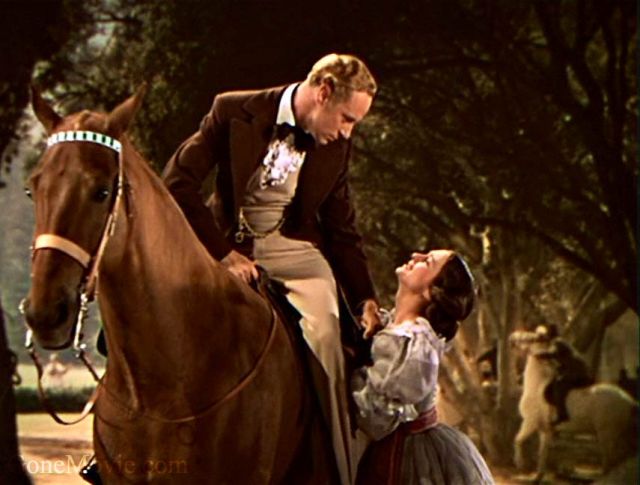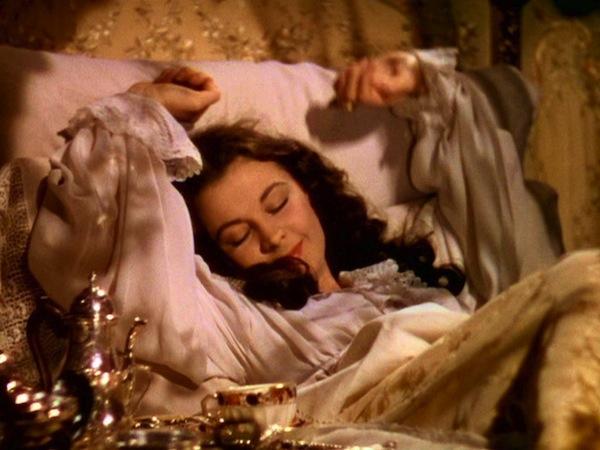Vivien Leigh deservedly won the Best Actress Oscar for her portrayal of the mercurial Scarlett O'Hara in Gone With the Wind, so producer David O. Selznick's legendary Civil War epic has been re-released to coincide with her centenary. It is a tactless choice to have been made, however, at a time when movies are conscientiously addressing the horrors of slavery and the movement to overthrow it.
Django Unchained and Lincoln have been followed by 12 Years a Slave, Steve McQueen's landmark depiction of the degradation and brutality relentlessly inflicted on slaves working Louisiana sugar and cotton plantations. Last week, it was announced that Giancarlo Esposito would direct Ed Harris as John Brown and himself as the African-American abolitionist Frederick Douglass in a film about Brown's violent campaign to liberate southern slaves by igniting a war in Virginia.
In the context of such movies, it is hard to tolerate Scarlett sashaying around saying "Oh, fiddledeedee!" or Ashley Wilkes (Leslie Howard) mourning the good old days before the Civil War. It is the same sanctimonious hypocrite who recommends to Scarlett that they hire "free darkies" to work at their lumberyard because he fears their new manager will maltreat the convicts he has brought in. Ashley implies that if the manager whips the darkies instead it's of no matter: once a slave owner, always a slave owner.
 The film doesn't revere Ashley as it does his wife, the impossibly saintly Melanie (Olivia de Havilland). His equivocal treatment of Scarlett – kissing her passionately one second, renouncing her the next – and his nostalgic rhapsodizing about happiness founded on cruelty contrasts him with Rhett Butler (Clark Gable). An unsentimental realist, Rhett is as blunt about the South's future as he is expressing his feelings for Scarlett. His love for her doesn't indulge the coquettish Southern belle image she has knowingly devised to dazzle her admirers. "You can drop the magnolia and moonlight," he snaps at her when she simpers once too often, the self-consciously written rebuke important because it makes the viewer aware that the genteel South of Margaret Mitchell's story was a propagandist construct.
The film doesn't revere Ashley as it does his wife, the impossibly saintly Melanie (Olivia de Havilland). His equivocal treatment of Scarlett – kissing her passionately one second, renouncing her the next – and his nostalgic rhapsodizing about happiness founded on cruelty contrasts him with Rhett Butler (Clark Gable). An unsentimental realist, Rhett is as blunt about the South's future as he is expressing his feelings for Scarlett. His love for her doesn't indulge the coquettish Southern belle image she has knowingly devised to dazzle her admirers. "You can drop the magnolia and moonlight," he snaps at her when she simpers once too often, the self-consciously written rebuke important because it makes the viewer aware that the genteel South of Margaret Mitchell's story was a propagandist construct.
Directed by Victor Fleming, with uncredited contributions by George Cukor and Sam Wood, Selznick's opus has never seemed to me to warrant the accolades it received in 1939 and subsequently. The script and direction patronised Tara's blacks, especially Oscar Polk's Pork and Everett Brown's Big Sam, though Hattie McDaniel, as the redoubtable Mammy (pictured below) and Butterfly McQueen as the childlike Prissy gave great, nuanced performances in stereotypical roles. The casual racism aside, Gone With the Wind is, like most historical films of the 1930s, a pipedream – it's sumptuousness and occasional garishness (all those Technicolor sunsets), augmented by Max Steiner's sentimental score, amounting to the prettification of a lie.
 There are, of course, moments of quintessential cinema: notably Scarlett's perilous buggy ride through the burning Atlanta with Rhett – mirrored later by her risky trip alone into the shantytown – and the celebrated crane shot that rises above her as she picks her way through acres of prostrated Confederate casualties. Less feted interior moments are also effective: Scarlett's point-of-view shooting of the Yankee deserter who menaces her in the darkened stairs at Tara after her return from Atlanta; the post-coital scene between Rhett and the kindly brothel-keeper, Belle Watling (Ona Munson), that reveals, though he's oblivious to it, that she's hopelessly in love with him.
There are, of course, moments of quintessential cinema: notably Scarlett's perilous buggy ride through the burning Atlanta with Rhett – mirrored later by her risky trip alone into the shantytown – and the celebrated crane shot that rises above her as she picks her way through acres of prostrated Confederate casualties. Less feted interior moments are also effective: Scarlett's point-of-view shooting of the Yankee deserter who menaces her in the darkened stairs at Tara after her return from Atlanta; the post-coital scene between Rhett and the kindly brothel-keeper, Belle Watling (Ona Munson), that reveals, though he's oblivious to it, that she's hopelessly in love with him.
Unrequited and frustrated love propel Gone With the Wind, engendering swathes of masochism and sadism, not to mention an ugly sex war. Scarlett thinks she wants Ashley, but (little does she know) she needs Rhett. Tortured by Oedipal love for her, he endures her first two marriages and the failure of their own. The dance that entangles this pair of social rebels with the virtuous Ashley and Melanie is fascinating, but psychologically suspect. Scarlett's futile passion for Ashley may be explained by the Elektra Complex and his equivocating desire for her, yet it's unlikely such a hypersexual women would pursue someone that insipid for years when a man as charming, virile, and adoring as Rhett is there champing at the bit. Her fascination with him is apparent from her first sighting of him at the Twelve Oaks party, though it is admittedly tinged with a fear of ravishment.
 The rationale for Scarlett's long-term resistance to Rhett is that succumbing to him would cost her the ability to manipulate him economically on her own terms. She has been described as a bitch, but her selfishness is integral to her survival. Given its dreadful conclusion, her withholding of sex – as tantalizing an erotic spectacle as Hollywood has ever attempted – could be construed as a metaphor for the death throes of the South. The conflagration that reunited the nation is mirrored in Rhett's drunken off-screen violation of Scarlett, the mise-en-scène turning Gothic as he hurtles up the vast staircase into darkness, his wife struggling in his arms.
The rationale for Scarlett's long-term resistance to Rhett is that succumbing to him would cost her the ability to manipulate him economically on her own terms. She has been described as a bitch, but her selfishness is integral to her survival. Given its dreadful conclusion, her withholding of sex – as tantalizing an erotic spectacle as Hollywood has ever attempted – could be construed as a metaphor for the death throes of the South. The conflagration that reunited the nation is mirrored in Rhett's drunken off-screen violation of Scarlett, the mise-en-scène turning Gothic as he hurtles up the vast staircase into darkness, his wife struggling in his arms.
Smiling with satiety the following morning, Scarlett has had her decadent love for Ashley (Howard is pictured above, with Olivia de Havilland), symbol of obsolescence and racist exploitation, raped out of her. Fatal to the movie, her welcoming of this purging is preceded by a scene in which he threatens to tear her to pieces or crush her skull and followed by one in which he talks of breaking her neck or whipping her with a buggy whip. Sexual reconstruction, no less than sociopolitical, comes at a price. Crushing Scarlett's independent spirit, Gone With the Wind's misogyny is off the charts. How did they get away with it, even in 1939?















Add comment